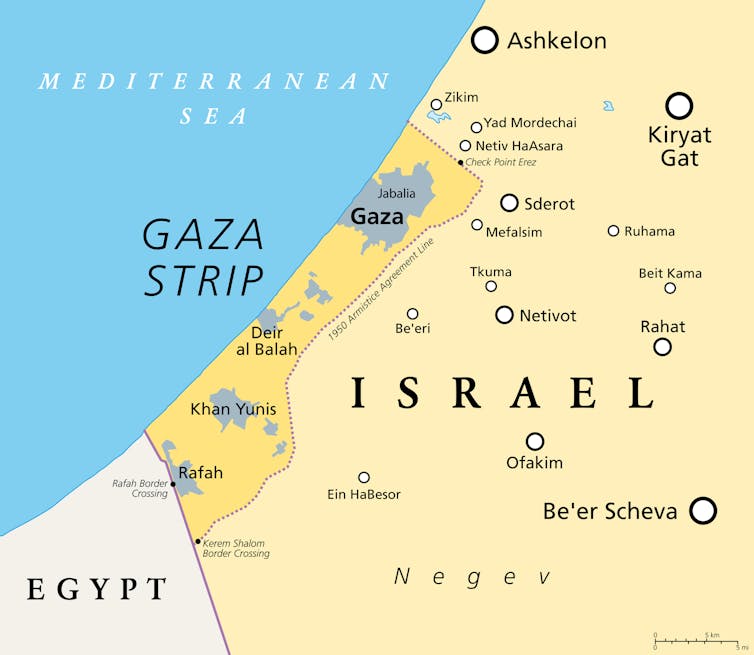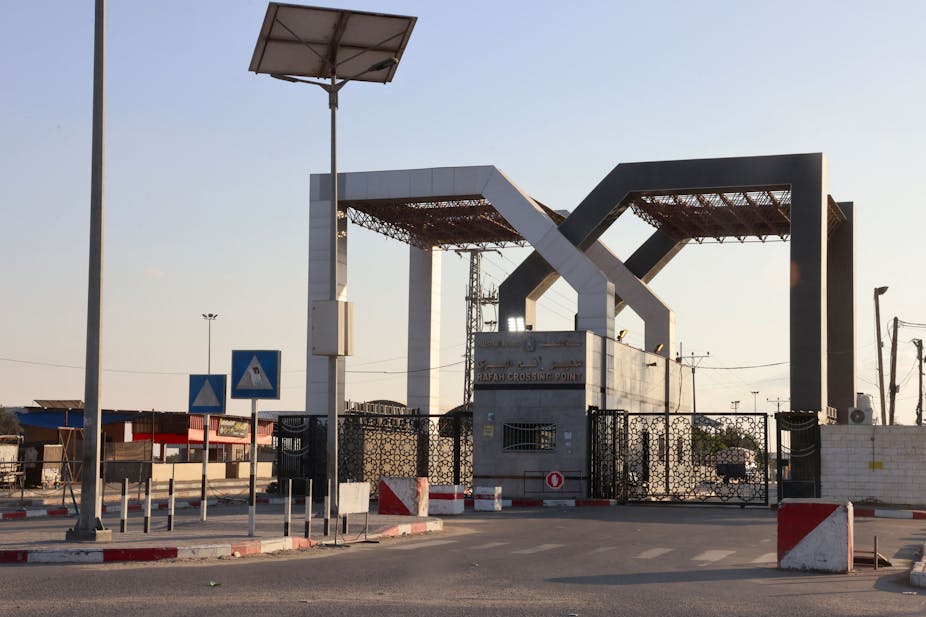Israel’s siege on the Gaza Strip – after a devastating Hamas attack on Israel – has caused alarm in Egypt. Egypt shares a 12km-long border with Gaza and controls the main exit point – the Rafah crossing – for the approximately 2 million people living there.
Moina Spooner, from The Conversation Africa, asked Lorenzo Navone who has done various research on the border between Gaza and Egypt for almost 10 years, to share insights into the border’s significance.
How significant is the Rafah border crossing to both Egypt and the Gaza?
Egypt’s eastern region, Sinai, borders both Israel and Gaza. This has historically given it an important role to play in the Palestinian-Israeli conflict because it controls one of the two main border crossings for civilians. The Rafah crossing is the only border Gaza has which isn’t directly administered by Israel.
It’s vital to the survival of Gazans. Since 2007, Israel has imposed a blockade (over land, sea and air) and an embargo on the Gaza Strip. This followed the withdrawal of Israelis from the Gaza Strip in 2005 and after Hamas won the 2006 elections.
Egypt has de facto supported Israel’s blockade because the Rafah border is tightly controlled, only opening on an unpredictable and occasional basis.

Gaza depends entirely on international humanitarian aid, the labour of the few Palestinians allowed to work in Israel, and on tunnels dug under the Egyptian-Gaza Strip border. To both Egypt and Israel, the tunnels constitute a threat since they can be eventually used for arms smuggling and terrorist infiltration.
However, the blockade of the Gaza Strip has had a dramatic impact on the lives of more than two million Palestinians living in Gaza. They lack access to fundamental rights, including food, education, jobs and health.
For almost 20 years now, the Gaza Strip has effectively been an open-air prison. The Rafah border crossing therefore holds immense significance for Palestinians as it serves as one of the few access points for the movement of people, goods, and humanitarian aid into and out of Gaza. It allows Palestinians to maintain vital connections with the outside world and access essential resources. Its operation plays a pivotal role in easing the hardships faced by Gazans.
What does the new outbreak of war mean for the Gaza-Egyptian border?
The outbreak of the current war between Israel and Hamas, together with other Palestinian resistance factions, highlights three key issues:
the importance of the Rafah crossing for the stability of the region and for Palestinians in Gaza;
the potential expulsion of Palestinian refugees from Gaza; and
Egypt’s ambiguity towards the Palestinian people.
First, although the Rafah crossing is the only way out of the Gaza Strip, it has been closed more often than it’s been open for almost 20 years. Bear in mind that a border crossing should work 24/7.
The openings were sporadic and the conditions for a transit authorisation were unclear. It’s also unclear who governs the crossing and who decides on its openings.
In recent years, Gaza’s residents have depended on the functioning of the Rafah crossing and on the tunnels. This is even more true today: it represents an actual lifeline for Gaza’s residents.
Second, a humanitarian opening of the crossing would probably mean the arrival of thousands of displaced Palestinians in Egypt. Egypt will not be willing to welcome them because it fears that they will stay permanently.
Finally, the issue of not easily accepting Palestinians refugees brings out Egypt’s ambiguous position towards them. Among the Arab countries bordering Israel and the Occupied Palestinian territories, Egypt is the only one that hasn’t allowed the establishment of Palestinian refugee camps on its land, unlike Syria which hosts over 500,000 refugees, Jordan which hosts 2 million, and Lebanon which hosts over 200,000.
On one hand, in its rhetoric, Egypt opposes the deportation of Palestinians from Gaza and supports them in their struggle to obtain a sovereign state.
On the other hand, Egypt is currently an overpopulated country with a fragile economy and will not want a new mass of poor people entering its territory. Since 1948, it’s estimated (though it’s not truly known) that there are about 80,000 Palestinians living in Egypt. Most of them won’t have citizen rights and live outside of any legal and humanitarian protection framework.
What should Egypt do given the complexity of the situation?
Right now, the situation is very volatile, but I believe that Egypt is not managing anything at all: in fact, it rather seems a passive spectator of ongoing events.
If we rule out an unlikely Egyptian military intervention to stop Israel’s assault on Gaza (which could eventually lead to a larger regional war), Egypt only has two options.
First, to use all the diplomatic avenues at its disposal to negotiate a ceasefire. This will be an immense challenges as Israel perceives the Gaza Strip and all its inhabitants (including minors, women, and the elderly) as an existential threat, meaning that it has no intention of suspending the war nor of listening to anyone.
Or second, to provide humanitarian assistance to the internally displaced people in the Gaza Strip through safe corridors. Israel cut off Gaza’s electricity, gas, internet and water supply before its assault. Thus, Gaza is currently experiencing a total blackout and starvation.
Right now the main risk, which Egypt must bear in mind when making this decision, is the immense loss of life facing Gazans.


